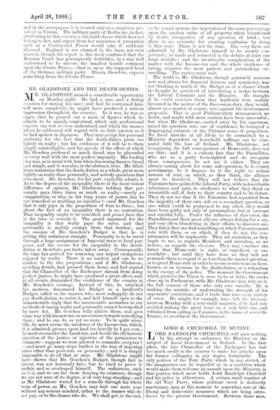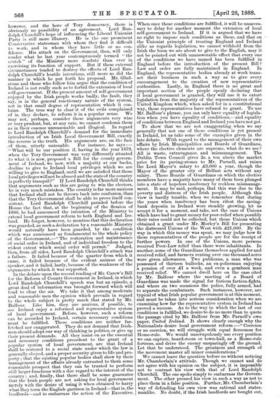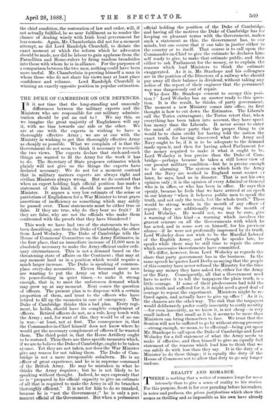LORD R. CHITRCHILL IN MUTINY.
TORD RANDOLPH CHURCHILL will gain nothing by his attempt to embarrass the Ministry on the subject of Local Government in Ireland. In the first place, the late Chancellor of the Exchequer has lost too much credit in the country to make his attacks upon his former colleagues in any degree formidable. The only portion of the Tory Party which by any stretch of the imagination can be regarded as in a condition which would make them welcome an assault upon the Ministry, is that portion which most holds Lord Randolph Churchill and his policy in abhorrence. A certain small number of the old Tory Party, whose political creed is distinctly reactionary, may at this moment be somewhat sore at the liberal and democratic measures which are being intro- duced by the present Government. Between these men, however, and the hero of Tory democracy, there is obviously no possibility of an agreement. Lord Ran- dolph Churchill's hope of influencing the Liberal Unionist Party is still more illusory. He is the one prominent Conservative statesman with whom they find it difficult to work, and in whom they have little or no con- fidence. His attack on the Government, then, will only render what he last year contemptuously termed "the crutch" of the Ministry more resolute than ever in exercising its function of support. But if these external circumstances tended to destroy the effects of Lord Ran- dolph Churchill's hostile intentions, still more so did the manner in which he put forth his proposal. Mr. Glad- stone and those who follow him argue that the condition of Ireland is not really such as to forbid the extension of local self-government. If the present amount of self-government enjoyed by the Irish people works badly, the fault, they say, is in the general reactionary nature of the system, not in that small degree of representation which it con- tains. The true way to clear it of the evils complained of is, they declare, to reform it in a popular sense. We may not, perhaps, consider these arguments very wise or very prudent, but, at any rate, we cannot condemn them as in their essence unreasonable and illogical. In regard to Lord Randolph Churchill's demand for the immediate introduction of an Irish Local Government Bill, exactly the reverse is the truth. His arguments are, on the face .of them, utterly untenable. For instance, he says:— " What will be our position if, having in the year 1879, when the Tory Government was very differently situated . to what it is now, proposed a Bill for the county govern- ment of Ireland, we now, with a majority at our backs, . decline to give to Ireland local privileges which we are willing to give to England, until we are satisfied that those local privileges viillnot be abused and the state of the country is perfectly tranquil?" If Lord Randolph Churchill thinks that arguments such as this are going to win the electors, he is very much mistaken. The country is far more anxious that Ireland shall not be thrown back into confusion, than that the Tory Government shall be able to prove itself con- . sistent. Lord Randolph Churchill paraded before the House the fact that, at the beginning of the Session of 1886, he had announced the intention of the Ministry to • extend local government reform to both England and Ire- land. He forgot, however, to mention that this declaration .was guarded, as such a declaration by a reasonable Ministry would naturally have been guarded, by the condition which was announced as fundamental to the whole policy of the Government,—" The restoration and maintenance of social order in Ireland, and of individual freedom to the widest extent which social order will permit." Judged, then, from all sides, Lord Randolph Churchill's attack was a failure. It failed because of the quarter from which it came, it failed because of the evident animus of the -speaker, and it failed, lastly, because of the weakness of the arguments by which it was supported. In the debate upon the second reading of Mr. Carew's Bill for the Reform of County Government in Ireland, in which Lord Randolph Churchill's speech was but an episode, a great deal of information was brought forward which will tend to clear the air. We take it that among moderate and reasonable men the opinion which prevails in regard to the whole subject is pretty much that stated by Mr. Balfour. Like him, they are anxious, if possible, to .see Ireland enjoy a reformed and representative system of local government. Before, however, such a reform can be accorded to Ireland, certain necessary conditions must be fulfilled. These conditions are neither far- fetched nor exaggerated. They do not demand that Irish- men should adopt our way of thinking in politics, or give up their present demands. All they insist on as the essential and necessary conditions precedent to the grant of a popular system of local government, are that Ireland shall be restored to a social state under which the law is generally obeyed, and a proper security given to life and pro- perty ; that the existing popular bodies shall show by their management of the affairs already entrusted to them some reasonable prospect that they can be trusted to perform still larger functions with a due regard to the interest of the country ; and, finally, that there shall be some guarantee that the Irish people are not asking for local government merely with the desire of using it when obtained to harry what they term the English garrison in Ireland—that is, the landlords—and to embarrass the action of the Executive. When once these conditions are fulfilled, it will be unneces- sary to delay for another moment the extension of local self-government to Ireland. If it is argued that we have no right to impose such conditions as these, and that on the Unionist principle of treating England and Ireland alike as regards legislation, we cannot withhold from the Irish the boon we are about to give to the English, may it not be pointed out with unanswerable effect that every one of the conditions we have named has been fulfilled in England before the introduction of the present Bill ? Law and order are fully maintained in England. In England, the representative bodies already at work trans- act their business in such a way as to give every encouragement to the creation of new representative authorities. Lastly, in England there is no great and important section of the people openly declaring that if local government is granted, they will use it to extort legislation from the majority of the representatives of the United Kingdom which, when asked for in a constitutional way, those representatives have refused to grant. To use Mr. Balfour's phrase, you can only have equality of legisla- tion when you have equality of conditions,—and equality of conditions between England and Ireland you have not got. To show that we are not exaggerating when we say generally that not one of these conditions is yet present in Ireland, let us take some of the examples given in the late debate. With regard to the management of their own affairs by Irish Municipalities and Boards of Guardians, where the elective elements are supreme, what do we see ?
All is waste, extravagance, and mismanagement. The Dublin Town Council gives 2s. a ton above the market price for its paving-stones to Mr. Parnell, and raises the Lord Mayor's salary to £3,000 a year, though the Mayor of the greater city of Belfast acts without any salary. Those Boards of Guardians on which the elective members have a majority have many of them been plunged into a state of hopeless insolvency by reckless mismanage- ment. It may be said, perhaps, that this was due to the poverty and distress of the Irish people. Although this view is hardly tenable, when we remember that during the years when insolvency has been rifest the saving. bank deposits in Ireland were steadily growing, let us accept it for a moment, and take, not the case of Unions which have had to grant money for poor-relief when possibly their rates could not be collected, but those Unions which obtained a grant under Mr. Morley's Bill for presenting the distressed Unions of the West with £21,000. By the way in which this money was spent, we may judge how fit these representatives of the people are for the receipt of further powers. In one of the Unions, more persons received Poor-Law relief than there were inhabitants. In another, some of the Guardians themselves applied for and received relief, and farmers renting over one thousand acres were given allowances. Two publicans, a man who was possessed of thirteen bullocks, an ex-policeman enjoying a pension of over ..t1 a week, and even a gombeen man received relief. We cannot dwell here on the case cited by Mr. Balfour where the meeting of a Board of Guardians was made the signal for furious faction-fights, and where on two occasions the police, fully armed, had to separate the combatants. Such instances, however, are typical of what Irish popular government is at this moment, and must be taken into serious consideration when we are examining how far the representative system in Ireland has proved a success. As to the way in which the last of our conditions is fulfilled, we desire to do no more than to quote the passage cited by Mr. Balfour from Mr. Parnell's own paper, United Ireland. It shows clearly enough why the Nationalists desire local government reform :—" Coercion or no coercion, we will struggle with equal fierceness for Home-rule. We would unscrupulously use every position we can capture, board-room or town-hall, as a Home-rule fortress, and drive the enemy unsparingly off the ground. Let that be understood. The greatness and strength of the movement master all minor considerations."
We cannot leave the question before us without noticing Mr. Chamberlain's attitude. Though we cannot and do not agree with his opinion on the subject, it is impossible not to contrast his view with that of Lord Randolph Churchill. The one spoke simply to embarrass the Govern- ment. The other pressed his view in such a way as not to place them in a false position. Further, Mr. Chamberlain's way of defending his own view was rational and states- manlike No doubt, if the Irish landlords are bought out, the chief condition, the restoration of law and order, will, if not actually fulfilled, be so near fulfilment as to render the chance of dealing wisely with Irish local government far less remote. Again, Mr. Chamberlain did riot for a moment attempt, as did Lord Randolph Churchill, to dictate the exact moment at which the reform which he advocates should be made, nor did he labour to gain applause from the Parnellites and Home-rulers by firing random broadsides into those with whom he is in alliance. For the purposes of a comparison between the two men, nothing could have been more useful. Mr. Chamberlain is proving himself a man in whom those who do not share his views may at least place confidence and reliance. Lord Randolph Churchill is winning an exactly opposite position in popular estimation.




































 Previous page
Previous page